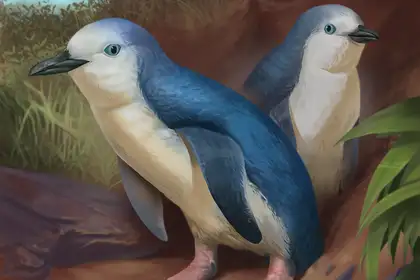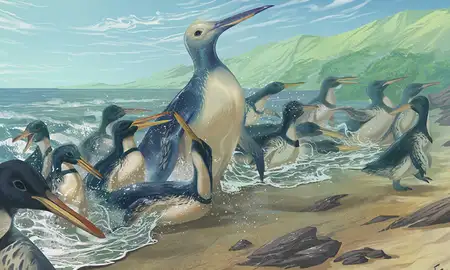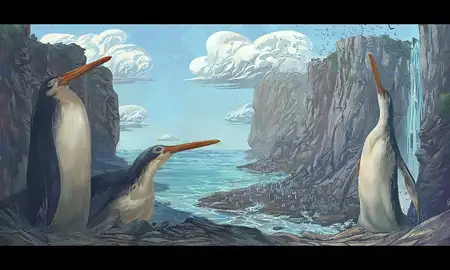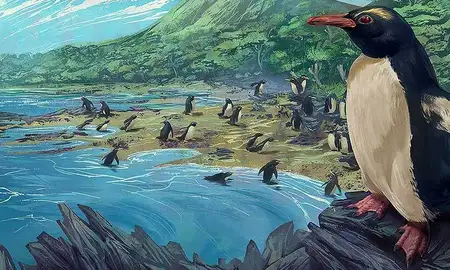
Wilson’s little penguin – Eudyptula wilsonae. Image credit: Simone Giovanardi.
New research led by Dr Daniel Thomas details the fossils of the new penguin species and provides a more complete picture of the seabird fauna of Te Riu-a-Māui Zealandia.
The fossils, discovered by Karl Raubenheimer, were found in three-million-year-old sediments within the rohe of Ngāti Ruanui and Ngāruahine in the southern Taranaki region of Te Ika-a-Māui North Island.
The nearly complete skulls of an adult and a fledged juvenile have been analysed by the team led by Te Kunenga ki Pūrehuroa Massey University, who determined the new species as being part of the little penguin lineage. The project team was formed by curator Alan Tennyson from Museum of New Zealand Te Papa Tongarewa and included Dr Felix Marx from Te Papa and Dr Daniel Ksepka from Bruce Museum in the USA.
Dr Thomas says this work helps to illustrate ancient penguin origins and provides significant evolutionary links between living animals and their Zealandia ancestors.
“These newly discovered fossils show little penguins like kororā have been part of coastal ecosystems of Zealandia for at least three million years. This is important when thinking about the origins of these penguins, the evolution of the seabird diversity of Aotearoa and the dynamic environment in which they live. For one thing, the climate has changed a lot over this time and this lineage has been robust to those changes.”
As a global biodiversity hotspot for seabirds, Aotearoa New Zealand has around a third of the world’s penguin species as breeding residents, with several other penguin species passing through as visitors. Kororā are the smallest living penguin species and are a taonga (valued) species with special significance to many across Aotearoa, including researchers at Massey.
The resulting research supports a Zealandian origin for the little penguins and confirms their presence during the Neogene period. The link between kororā with the extinct species is particularly interesting as the age of newly described fossils suggests the close relatives of kororā living in Australia today may have originally come from Zealandia.
The fossils of the new species are now housed at Museum of New Zealand Te Papa Tongarewa, where they are contributing to a larger study led by co-author Alan Tennyson. The study explores animals living in Zealandia during the last time the region was substantially warmer than today, similar to temperatures that climate modellers predict the world could reach by the end of the current century.
Dr Thomas says the temperature rise could result in big changes in Aotearoa in terms of biodiversity.
“The rising temperature means more species will find Aotearoa habitable, so it’s important to learn as much as we can about the species that lived here during the last warm-world phase.”
The fossils also reveal that the physical characteristics of little penguins have remained largely unchanged across three million years, despite substantial environmental changes in the region across that time.
The new species has been named Eudyptula wilsonae after the late New Zealand ornithologist Kerry-Jayne Wilson MNZM, who was an internationally respected seabird researcher and advocate for conservation. Ms Wilson cofounded the West Coast Penguin Trust, a community-led NGO dedicated to conserving the seabirds and habitats of the West Coast region.
Dr Euan Kennedy, a former student and close friend and colleague of Ms Wilson, says it’s uplifting to see her legacy live on in Eudyptula wilsonae.
“It’s a very generous recognition of a courageously motivated seabird champion whose formidable energy, talent and passion she herself shared generously. She lived for seabirds, and for their future in the hands of tomorrow’s talented young researchers.”
In the early 2000s, Ms Wilson was called upon to advise and lead a group of residents concerned at the apparent decline of the little penguins in the Charleston area which led to the West Coast Penguin Trust being established. As the Trust’s first Chair in 2006, she only stepped down in 2020 to complete her final book ‘Seabirds – A natural history’. She remained linked to the Trust as a scientist and guide until her passing in March 2022, ensuring the Trust’s work was evidence-based and its conservation efforts extended from little penguins to tawaki Fiordland crested penguins and tāiko Westland petrels.
West Coast Penguin Trust Manager Inger Perkins says the Trust was fortunate to have Ms Wilson and her seabird wisdom at its helm for many years.
“Naming this new species of little penguin after her is a wonderful and fitting acknowledgement for her enormous contribution to seabird science over many decades. We are thrilled her name will live on in connection with penguins, it is a tremendous and richly deserved honour.”
Penguin researcher and long-time friend of Ms Wilson, Professor Lloyd Spencer Davis of University of Otago, agrees the new species’ name is wonderful.
“Kerry-Jayne would be chuffed to be forever immortalised with her darling seabirds!”
The research has recently been published in the Journal of Paleontology in a paper titled ‘Pliocene fossils support a New Zealand origin for the smallest extant penguins’.
Related news
Discovery of largest-known penguin species reveals significant evolutionary insight
Senior Lecturer in Zoology and Ecology, Dr Daniel Thomas, is part of an international team describing two new extinct penguin species, with one suggested to be the largest ever discovered at an estimated average weight of 155 kilograms.

Giant Waikato penguin: school kids discover new species
A giant fossilised penguin discovered by Hamilton school children has been revealed as a new species by Massey University researchers.

Newly-described fossils reveal an ancient origin for New Zealand penguins.
New Zealand is surrounded by highly productive oceans that attract seabirds from around the world, forming a global hotspot for seabird diversity. Establishing how and when this hotspot formed has been challenged by a lack of fossil discoveries connecting New Zealand's living seabirds to their ancient relatives.
